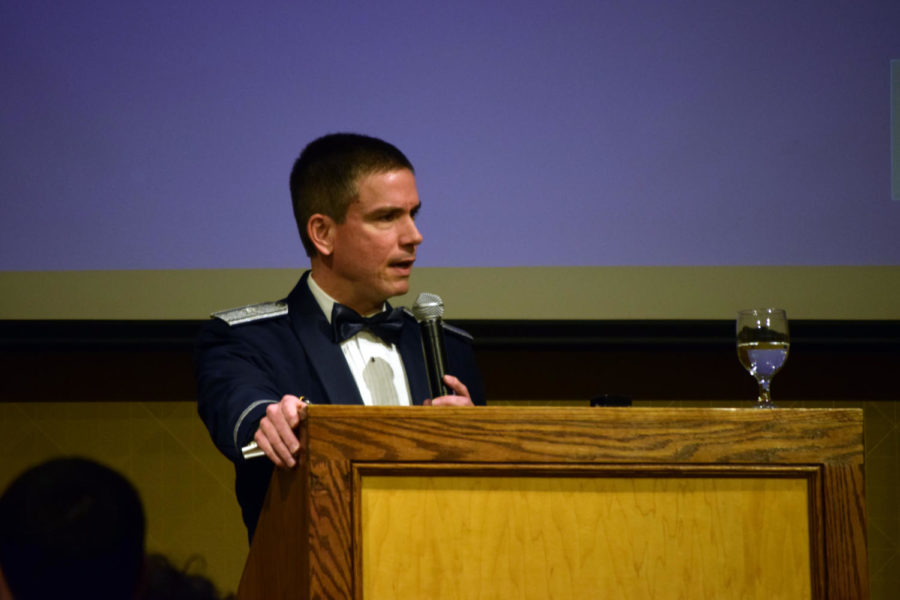Brigadier General shares life lessons with Air Force ROTC cadets
March 29, 2015
The sound of spoons tapping on tabletops, the Air Force way to applaud, filled a ballroom at the Gateway Hotel as Brig. Gen. Paul Tibbets IV walked to the podium Saturday.
Air Force ROTC cadets and their guests heard Tibbets speak at the Detachment 250 spring Dining Out ceremony. The formal event comprised a social hour, dinner, speech, cadet awards and a ballroom dance.
“It’s a great perspective to learn from [senior officers],” said Cadet Juan Carlos Nieves-Perez, senior in aerospace engineering, who was the special projects officer in charge of planning the ceremony. “They are kind of at the top of the food chain.”
Lt. Col. Ryan Hollman, detachment commander of AFROTC Detachment 250, said Dining Out is a chance for cadets’ families to see what military life is like and for cadets to interact with senior officers on active duty.
Tibbets spoke about a mission he leads at USSTRATCOM that manages readiness of U.S. nuclear deterrent forces. Deterrent forces include bombers, intercontinental ballistic missiles and ballistic missile submarines that the U.S. keeps, according to the U.S. Air Force website.
These forces provide “capability that helps deter our adversaries from thinking every morning when they wake up ‘you know what, I think today is the day I’m going to take on America,’” Tibbets said. “That would be a bad day, wouldn’t it?”
Previous Department of Defense secretary Chuck Hagel said USSTRATCOM was the department’s highest priority mission, Tibbets said.
“Without a safe, secure and effective nuclear deterrent, we could cease to exist as a nation,” Tibbets said.
A nuclear conflict would be devastating, so building and keeping credible nuclear capabilities is necessary to deter enemy forces, Tibbets said.
“If you wonder why we have these, it’s because we don’t want to actually take one and use it in anger ever again,” he said.
On Aug. 6, 1945, Tibbets’ grandfather Paul Tibbets Jr. piloted the Enola Gay; the B-29 bomber from which the first atomic bomb used in war was dropped on Hiroshima, Japan. He was a colonel at the time.
Tibbets Jr., who died in 2007, never had regrets about that mission.
“[The Japanese] were a proud people, and we were too,” Tibbets said. “They had signaled that surrender was not an option.”
The U.S. considered options of invading Japan or dropping bombs on the cities of Hiroshima and Nagasaki. The bombs were dropped and U.S and allied forces celebrated victory over Japan on Aug. 15, 1945, following Japanese surrender.
President Harry Truman called Tibbets Jr. into his office after the war and asked him what he thought.
“[My grandfather] said ‘Sir, I think I did what I was supposed to,’” Tibbets said.
Tibbets paraphrased from his grandfather’s book. He said after the war, the lives of he and his crew became urban legends and people would often blame the military men who executed the mission’s order for bringing the world into the atomic age.
“After the war, my grandfather always told inquisitors he slept just fine,” Tibbets said. “He said the objective was to stop the fighting and loss of life. Those of us who gained that victory have nothing to be ashamed of and neither do we offer an apology.”
His grandfather’s service showed courageous willingness to follow orders, Tibbets said.
Tibbets then offered life lessons that he has learned in his 25 years of military service to cadets who will soon enter the Air Force.
“You always have time for the things that you think are really important,” he said. “It’s up to you to decide what those are.”
At many retirement ceremonies, Tibbets said he hears people say they regret not spending more time with their families and urged cadets to find balance in their lives.
“Be yourself and don’t let anyone else define who you are,” he said. “You guys were all made for a purpose and a specific reason.”
He said people are made to be the way they are and they should celebrate that and find something they love to do.
“If you don’t love it, don’t keep doing it,” he said.
Tibbets congratulated the cadets and thanked their parents. Following the speech, a group of cadets sang the Air Force song and another group chanted the Air Force creed. Then 23 awards were presented to individual cadets for their service and dedication to the AFROTC program.
“I salute you, I thank you and I look forward to working with you,” Tibbets said.







